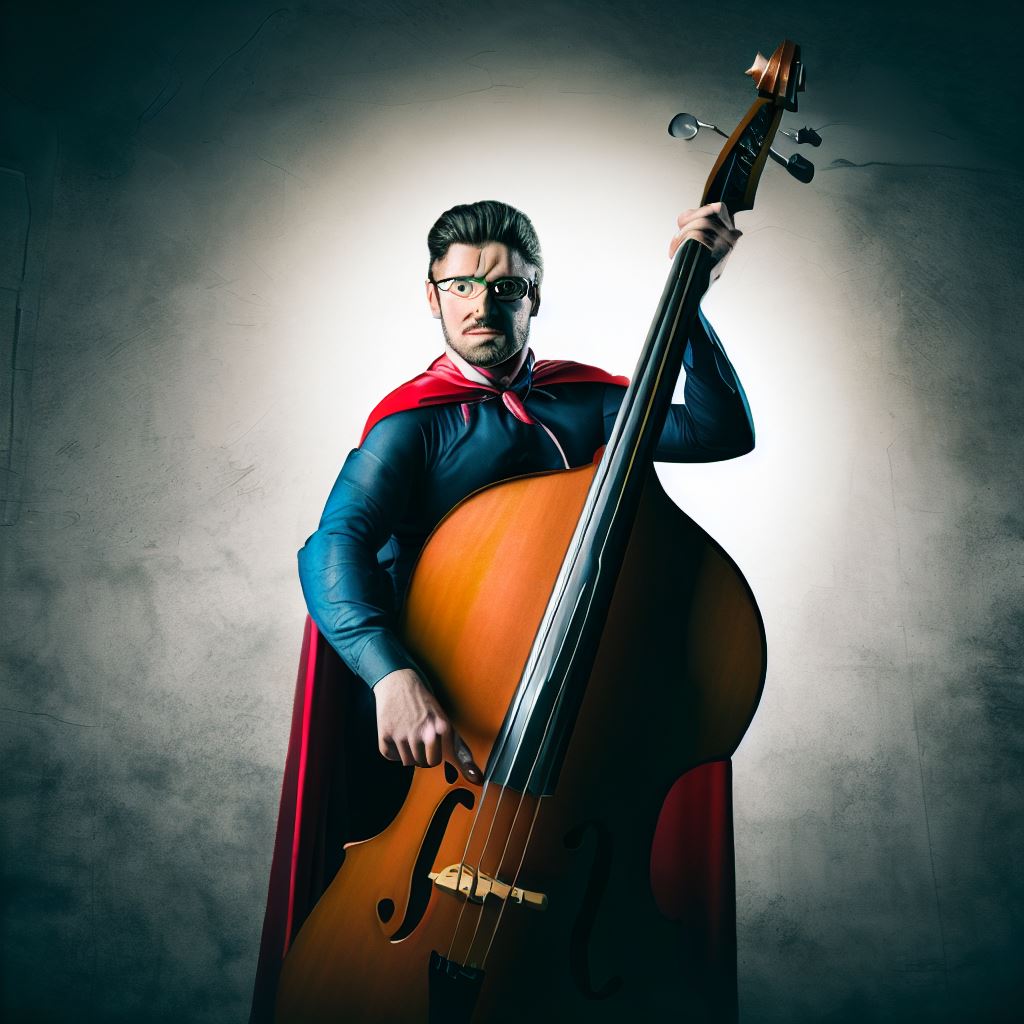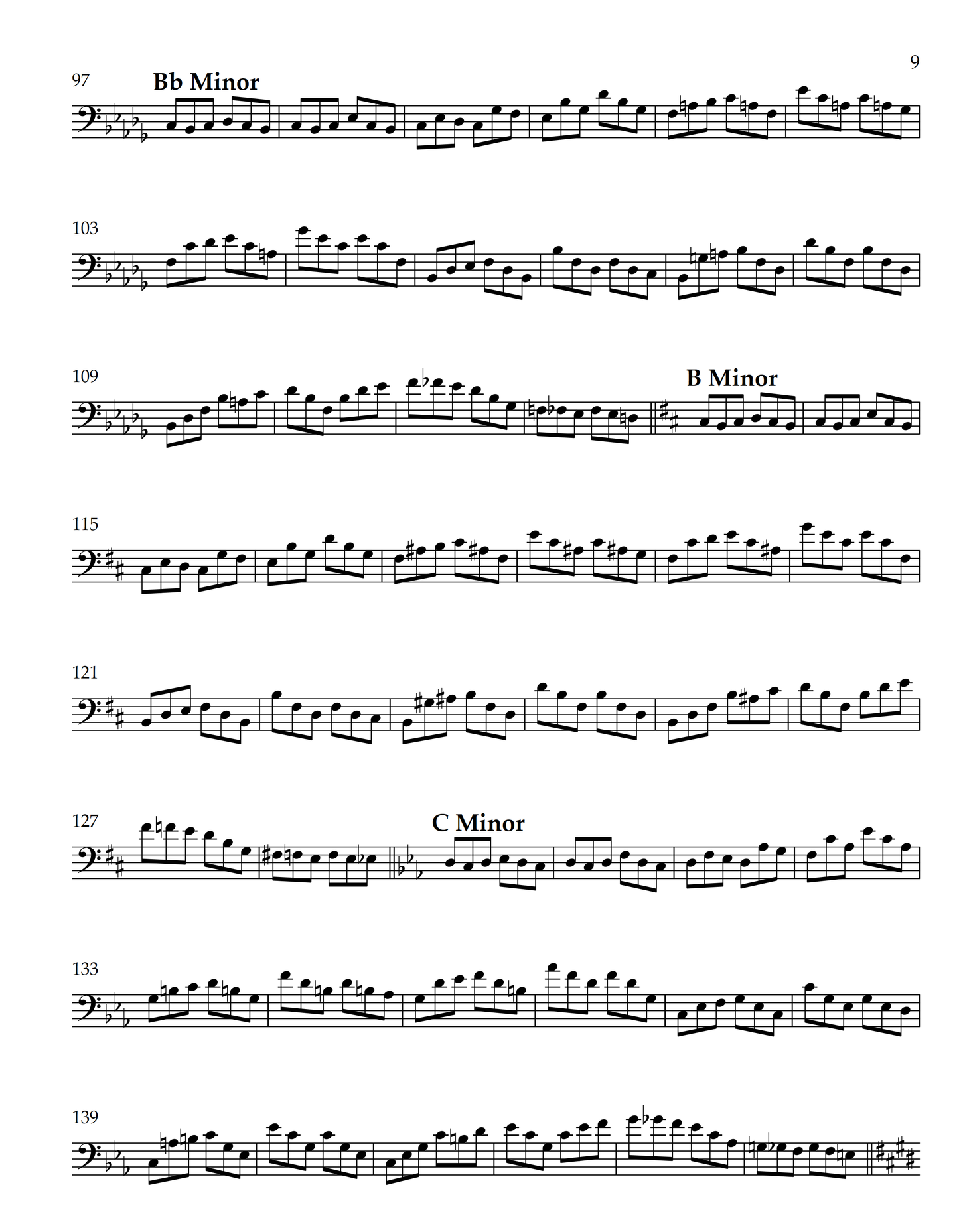Michael Kurth
Michael Kurth: Four Perptudities (etudes) for double bass
Michael Kurth: Four Perptudities (etudes) for double bass
Couldn't load pickup availability
About the Perptudities
What's a perta...perperp...purpletuple...portapotty...perpapootery?
Good question.
Yes, I made up the word. Yes, it sounds kind of stupid. A perpetudity is an etude with a beginning but no ending. An etude- in-perpetuity. It just keeps modulating through all twelve keys before circling back and eating its own tail. So, if a perpetudity is really perpetual, why offer four of them in the same volume? What if I become trapped in a temporal vortex?
Another good question.
My only response is: I have learned many arcane secrets from multi-dimensional creatures from distant worlds who have mastered the processes of both time travel and bass playing, and they assure me that enough alternate realities exist to accommodate (at least) four perpetual etudes if played with proper focus and care.
They do recommend the assistance of a non-playing spotter, someone who might alert the appropriate authorities in case of temporal emergency. (Temporal emergency number: ∛9*1∑ƒ77⊅. When prompted, press #99 to speak with a carbon-based emergency dispatcher.) ONLY USE IN ACTUAL TEMPORAL EMERGENCIES. PENALTIES FOR IMPROPER USE SHALL BE SWIFT AND SEVERE!!!
These perpetudities, or perpetual etudes, are non-specific; that is, they don't focus on any particular aspect of the bassist's technique. They can be used to improve any technique - intonation, tone, vibrato, rhythm, dynamic control, as well as improve focus and stamina.
They are also designed to be used in conjunction with any bowing method, such as Sevcik or Harold Robinson's Strokin'. Simply change the rhythm or bowing (or plucking) style as needed. Start at the beginning and see how far you can get, or pick a key you need some extra woodshedding in, or turn the pages upside down and practice reading backward. Kinda fun. Or develop superhuman focus and become the first bass-playing character in the Marvel universe. Or get bored with these and write your own.
About Michael Kurth
Kurth has been a member of the Atlanta Symphony bass section since 1994.
Michael Kurth thinks most artist biographies are pretentious and boring, and feels a welcome sense of liberation, not to mention mischief, when writing about himself in the third person. He further believes that all artist biographies should include whether the artist prefers cats or dogs, or is ambivalent. He allows that there is room for ambivalence on this issue.
Kurth prefers dogs.
He also enjoys shrimp burritos, dive bars, road trips, thrift stores, found art, shiny pants, folk plumbing, collecting odd musical instruments, neologism, and bourbon.
Kurth was born in 1971 in Virginia and grew up near Baltimore. He started playing the bass in fourth grade, went to public schools, and got his Bachelor’s Degree at Peabody Conservatory, where he studied bass with Harold Robinson. He also studied cello and viola at Peabody, and did okay at cello, but his ham-fisted viola playing caused his roommate Rick to forbid him from ever practicing it in their dorm room.
He once stole one of those convex security mirrors, just to savor the irony, but he feels a lingering sense of guilt, even though it was laying in a pile of stuff that was probably destined for the dumpster anyway. But still.
Kurth has been a member of the Atlanta Symphony bass section since 1994.
The ASO has commissioned and premiered many of his orchestral and choral works. A recording on the ASO Media label is scheduled for commercial release on CD and digital platforms in February 2019, including Everything Lasts Forever, A Thousand Words, May Cause Dizziness, and Miserere featuring Grammy Award-winning mezzo-soprano Kelley O’Connor.
He frequently collaborates with Atlanta poet Jesse Breite on vocal works, including Miserere, Tenebrae, and Magnificat.
He was named “Best New Composer” by Atlanta Magazine in 2017.
He has been awarded Artist-in-Residence fellowships from the Hermitage and Serenbe.
Many Atlanta-area artists have commissioned and performed his works, including the Atlanta Symphony Orchestra Chorus and Chamber Chorus, the Atlanta Chamber Players, the Atlanta Young Singers, the Gwinnett Young Singers, the Morehouse College Glee Club, the Peachtree String Quartet, the Franklin Pond String Quartet, the Atlanta Contemporary Ensemble, Concert Artist Guild Award-winning violist Jennifer Stumm, the Georgia Sinfonia, the Atlanta Community Symphony Orchestra, the DeKalb Symphony, the Georgia State University Wind Ensemble, and movement artists gloATL.
He teaches bass at Emory University.





